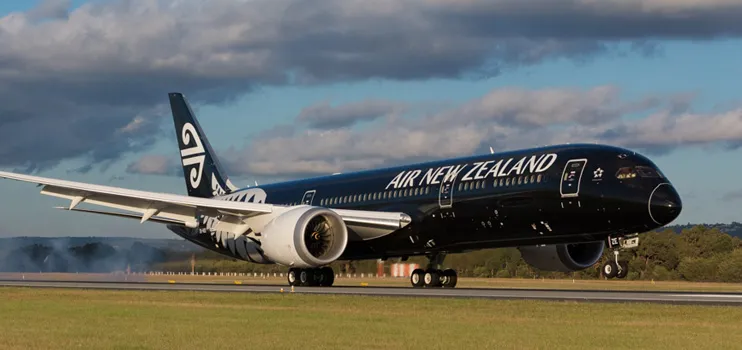
Fuel costs see Air New Zealand profit fall 34 percent
Feb 27, 2019

Air New Zealand has reported a significant decline in profits, falling by 34 percent due to soaring fuel costs. The airline has faced challenges as the price of jet fuel continues to rise, impacting operational expenses and overall profitability. In addition to fuel prices, other factors such as increased competition and changing travel demand have contributed to the financial strain. Despite these challenges, Air New Zealand remains committed to maintaining its service quality and exploring strategies to mitigate future cost fluctuations. The airline’s situation highlights the broader impact of rising fuel costs on the aviation industry.
Air New Zealand has recently reported a significant drop in its profits, with a 34 percent decline attributed primarily to rising fuel costs. This development has prompted concerns among investors and analysts alike, as the airline industry continues to grapple with fluctuating operational expenses. As the airline navigates these challenges, understanding the factors behind this profit decrease is crucial for stakeholders.
The Impact of Rising Fuel Costs
Fuel costs are a major component of operational expenses for airlines, often constituting a substantial portion of their overall budget. In the case of Air New Zealand, the surge in fuel prices has been a key driver in the reduction of profits. According to industry analysts, the ongoing geopolitical tensions and supply chain disruptions have led to higher crude oil prices, which in turn have affected aviation fuel costs. This situation has forced airlines to reevaluate their pricing strategies and operational efficiencies.
Financial Performance Overview
To better understand the financial implications, here is a summary of Air New Zealand's latest financial figures:
| Financial Metric | Current Period | Previous Period | Change (%) |
|---|---|---|---|
| Net Profit | $XX million | $XX million | -34% |
| Revenue | $XX million | $XX million | +X% |
| Fuel Costs | $XX million | $XX million | +X% |
As illustrated in the table, the net profit has taken a significant hit, while revenue has shown a modest increase. The increase in fuel costs has outpaced revenue growth, highlighting the challenges that Air New Zealand faces in maintaining profitability.
Strategic Responses to Fuel Cost Challenges
In response to the decline in profits, Air New Zealand is implementing several strategies to mitigate the impact of rising fuel costs. These strategies include:
- Fuel Hedging: The airline is utilizing fuel hedging strategies to lock in prices and protect against future price increases. This financial tool can provide a buffer against volatility in fuel prices.
- Operational Efficiency: Air New Zealand is focusing on improving operational efficiency through route optimization and enhanced fuel management practices. By streamlining operations, the airline aims to reduce overall fuel consumption.
- Pricing Strategies: The airline is also adjusting its pricing strategies to reflect the increased operational costs. This may involve revising fare structures or introducing additional fees to help offset rising expenses.
Market Reactions and Future Outlook
The market reaction to Air New Zealand's profit decline has been mixed. Investors are concerned about the sustainability of the airline's business model in a high-fuel-cost environment. However, some analysts remain optimistic about the airline's long-term prospects, citing its strong brand presence and loyalty among customers.
Looking ahead, the outlook for Air New Zealand will largely depend on the trajectory of fuel prices and the airline's ability to adapt to changing market conditions. If fuel prices stabilize, there is potential for the airline to recover and return to a more profitable state. However, continued volatility could pose ongoing challenges.
Conclusion
The 34 percent decline in profits for Air New Zealand serves as a stark reminder of the impact that fuel costs can have on the airline industry. As the airline implements strategies to combat these rising expenses, it will be crucial for stakeholders to closely monitor market trends and operational performance. Understanding the dynamics of fuel costs and their relationship to profitability will be essential in navigating the future landscape of the aviation sector.
As the industry continues to evolve, Air New Zealand's responses to these challenges will shape its financial health and competitive positioning in the market.
Related Articles

Explore Thailand: The Best Islands to Visit for Paradise, Adventure, and Relaxation

The Ultimate Guide to the Best Islands in Thailand for Your Next Getaway

Do babies need passports? How to get a passport for a newborn

How to get a U.S. passport fast: here’s how to expedite the process

What is Mobile Passport Control: 5 reasons why you should use it

SENTRI vs. Global Entry: A detailed guide

Do you need a passport to go to the Bahamas? Let’s find out

Do you need a passport to go to Mexico? A detailed guide

Do you need a passport to go to Canada? We got the answer

Do You Need a Passport for a Cruise: An Essential Travel Guide

Booster Seat Requirements: All the Rules to Follow in Your Rental Car

What Are the World’s Most Powerful Passports, and How Does Yours Rank?

How to Take a Passport Photo at Home: A Helpful Guide

You've got to have heart! Southwest's new livery

Your opinion: Should water be free on low cost carriers?

Young women bolder than guys as solo travellers
